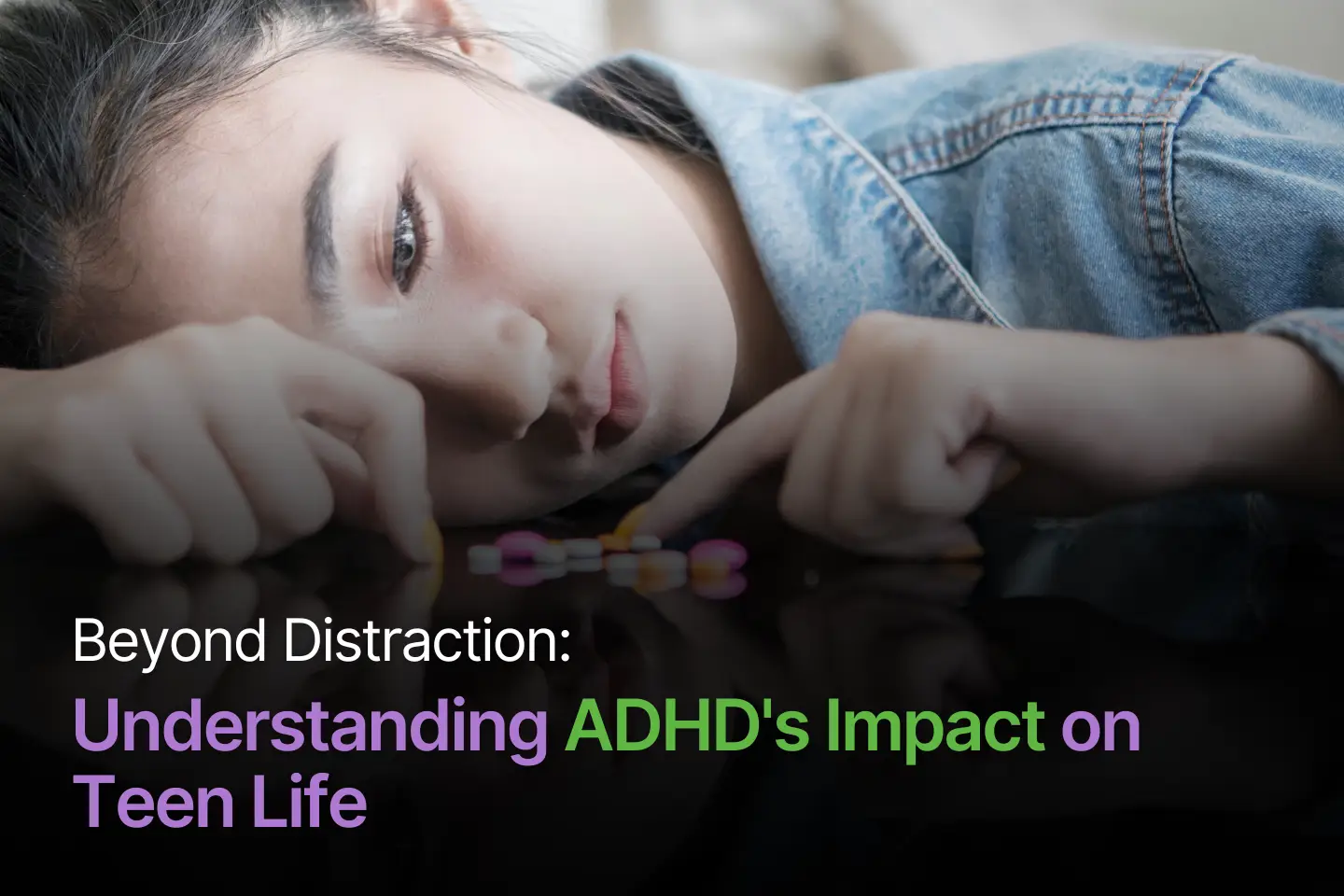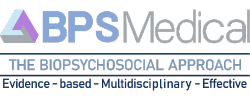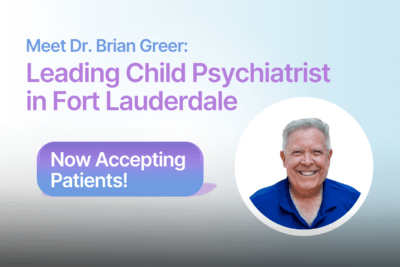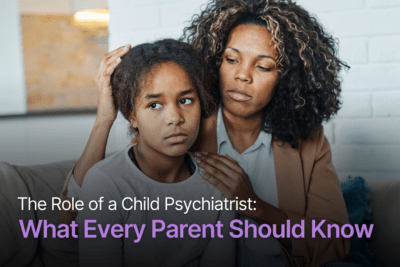
Home » Impact of ADHD in teenagers
Understanding the Impact of ADHD in Teenagers
(attention deficit hyperactivity disorder adhd)
ADHD (Attention Deficit Hyperactivity Disorder) affects an estimated 6-9% of adolescents globally, with approximately 11% of teenagers in the United States diagnosed with the condition. The impact of ADHD in teenagers can be profound, affecting various aspects of their lives, from academics to relationships and emotional development. For parents of adolescents with ADHD, understanding the disorder and its challenges is essential to provide the best support possible.
This guide will explore the diverse effects of ADHD on teenagers, offering insights for parents interested in treatment options. From academic challenges to personal growth, we’ll break down the unique hurdles ADHD presents and the strategies parents can adopt to help their teens navigate these formative years.
Understanding ADHD in Teenagers: Symptoms and Diagnosis
ADHD is a neurodevelopmental disorder that manifests through inattention, hyperactivity, and impulsivity. While ADHD symptoms often emerge in childhood, they can intensify or take on new forms during adolescence due to hormonal changes, social pressures, and increased academic demands. Here’s an overview of the primary symptoms:
Inattention: Trouble focusing on tasks, frequent daydreaming, difficulty organizing tasks or activities.
Hyperactivity: Feeling restless, difficulty sitting still, talking excessively.
Impulsivity: Acting without thinking, interrupting others, struggling with delayed gratification.
In teenagers, these behaviors can lead to developmental challenges, especially when untreated or misunderstood. Diagnosis involves assessments by qualified professionals, who look for patterns of these symptoms persisting for at least six months.
The Impact Teenagers with ADHD on Academic Life
School is often the first place where ADHD symptoms become visible, as the structured environment and academic demands highlight attentional and behavioral difficulties.
Difficulty with Focus and Time Management
Teens with ADHD may struggle with sustaining attention on tasks, leading to incomplete assignments, missed deadlines, and lower grades. They may frequently lose materials needed for class or forget about upcoming tests and projects.Executive Function Challenges
ADHD impacts executive functions, which include skills like planning, organizing, and following through on tasks. This can make it difficult for teens to balance assignments, study schedules, and extracurricular activities, contributing to academic underperformance despite potential.Social and Behavioral Challenges in School Settings
Impulsivity and hyperactivity can lead to frequent disruptions in class, making it difficult for teens to stay engaged or participate appropriately. These behaviors can also strain relationships with teachers and classmates, leading to disciplinary issues.
TIPS FOR PARENTS:
To help your teen with ADHD succeed academically, consider working with their school to create an Individualized Education Program (IEP) or 504 Plan. Both plans can offer accommodations like extra time on assignments, breaks during tests, or the ability to work in quieter environments.
ADHD and Relationships: Friends and Family Dynamics
Adolescence is a time when relationships are central to personal growth. However, ADHD can create challenges in forming and maintaining friendships and family bonds.
Impulsivity and Communication Struggles
Impulsivity can lead to misunderstandings, as teens with ADHD may interrupt others, speak out of turn, or react emotionally to situations. These tendencies can make social interactions with peers difficult and sometimes lead to social rejection.Emotional Regulation
Adolescents with ADHD often struggle with regulating emotions, which can lead to mood swings, frustration, or even anger. In family settings, this may manifest as arguments with parents or siblings, creating strain within the household.Difficulty with Peer Pressure and Decision Making
Adolescents with ADHD are at a higher risk of succumbing to peer pressure, given their tendency to act impulsively. This can result in risky behaviors or decisions, especially in environments where drugs, alcohol, or other risky activities are present.
TIPS FOR PARENTS:
Promote open, judgment-free communication at home so your teen feels safe discussing their challenges and feelings. Consider working with a family therapist specializing in ADHD to help improve emotional regulation, conflict resolution, and communication skills.
ADHD’s Effect on Self-Esteem and Personal Development
ADHD can significantly impact an adolescent’s self-image, as they may struggle with self-criticism or feelings of inadequacy, particularly when they compare themselves to peers.
Negative Self-Perception
Teens with ADHD often become aware of their difficulties, especially if they experience academic failures, social rejection, or frequent reprimands. Over time, this can lead to low self-esteem, as they internalize these challenges as personal failures.High Sensitivity to Criticism
Because of their struggle with emotional regulation, adolescents with ADHD may be highly sensitive to criticism, whether it’s from teachers, parents, or peers. This can lead to a cycle of self-doubt, particularly in an environment that doesn’t understand ADHD.Identity Development
Adolescence is a period of self-discovery, yet the constant battle with ADHD symptoms may hinder personal growth. Teens with ADHD may find it challenging to set and achieve goals, which are important for building a sense of identity and purpose.
TIPS FOR PARENTS:
Encourage positive reinforcement and celebrate small victories. Help your teen build confidence by focusing on their strengths and interests. Support from a counselor or therapist can also provide tools for building self-esteem and emotional resilience.
ADHD in Adolescents and Long-Term Development: Preparing for Adulthood
As teens with ADHD approach adulthood, they face unique challenges in preparing for a life of independence. Managing ADHD effectively during adolescence can make a significant difference in their transition to adulthood.
Life Skills Development
Teens with ADHD may need extra support in developing essential life skills, such as budgeting, time management, and self-care. Without these skills, the demands of adulthood may become overwhelming, leading to potential issues with career stability or financial management.Career Aspirations and Educational Goals
Many teens with ADHD have the potential to pursue higher education, but they may struggle with the discipline required for academic or career success. Parents can play a key role in helping their teens explore potential career paths that align with their strengths.Independence and Decision-Making Skills
Adolescents with ADHD may take longer to make responsible decisions independently. Skills like weighing risks, assessing consequences, and delaying gratification are often underdeveloped, necessitating guidance to make informed choices.
TIPS FOR PARENTS:
Consider coaching or mentoring services that focus on life skills for teens with ADHD. These services can help your adolescent learn essential skills for independent living, from managing finances to creating healthy routines.
When Should You Seek Help for ADHD in Teenagers?
Parents should consider seeking professional help if their child exhibits symptoms of ADHD that interfere with daily functioning at home, school, or in social settings. Early intervention is key. Signs to watch for include:
Persistent inattention, hyperactivity, or impulsivity lasting six months or longer.
Significant academic struggles, such as failing grades or difficulty completing tasks.
Challenges in maintaining relationships due to impulsive or disruptive behaviors.
Difficulty managing emotions, leading to frequent outbursts or frustration.
Seeking guidance from pediatricians, psychologists, or psychiatrists can help confirm a diagnosis and develop a tailored treatment plan.
Final Thoughts: Supporting Your Teen’s Journey with ADHD
Adolescence is already a complex and transformative time, and ADHD can add layers of challenges. As a parent, your understanding, patience, and proactive support are crucial. By focusing on their strengths and providing the right guidance, you can empower your teen to lead a fulfilling, productive life.
ADHD management isn’t one-size-fits-all. Personalized treatment plans that include medical, behavioral, and emotional support can make a profound difference. Remember, the journey to adulthood with ADHD is unique for every individual. With the right strategies and a supportive network, your teen can thrive, build resilience, and confidently step into the future.
SOURCES
CHADD (Children and Adults with Attention-Deficit/Hyperactivity Disorder): www.chadd.org
Offers resources, advocacy, and support for individuals and families managing ADHD.ADHD Awareness Month: www.adhdawarenessmonth.org
Provides educational materials and events to raise awareness about ADHD.American Academy of Pediatrics ADHD Toolkit: www.aap.org
Contains clinical guidelines and resources for managing ADHD.ADHD Statistics:
According to the CDC, 11% of children aged 4-17 in the U.S. have been diagnosed with ADHD as of recent studies, highlighting the prevalence and need for awareness.







